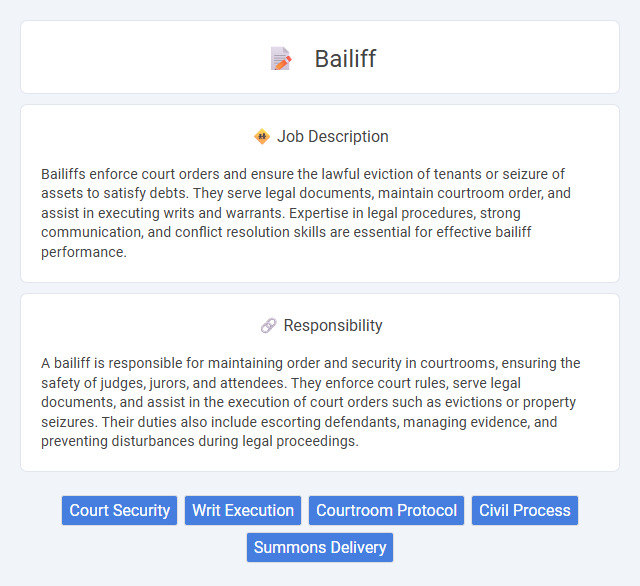
Bailiffs enforce court orders and ensure the lawful eviction of tenants or seizure of assets to satisfy debts. They serve legal documents, maintain courtroom order, and assist in executing writs and warrants. Expertise in legal procedures, strong communication, and conflict resolution skills are essential for effective bailiff performance.
Individuals who thrive in physically demanding environments and can maintain composure under stress may find a career as a bailiff suitable. Those with strong interpersonal skills and the ability to enforce rules impartially are likely to adapt well to this role. Conversely, candidates who struggle with confrontational situations or require a sedentary work setting might find this job challenging.
Qualification
A Bailiff must possess a high school diploma or equivalent, with many employers preferring candidates who have completed post-secondary education in criminal justice or law enforcement. Key qualifications include strong knowledge of legal procedures, effective communication skills, and the ability to remain calm under pressure. Certification or training in conflict resolution and physical restraint techniques enhances job performance and compliance with court security protocols.
Responsibility
A bailiff is responsible for maintaining order and security in courtrooms, ensuring the safety of judges, jurors, and attendees. They enforce court rules, serve legal documents, and assist in the execution of court orders such as evictions or property seizures. Their duties also include escorting defendants, managing evidence, and preventing disturbances during legal proceedings.
Benefit
Bailiffs likely secure financial benefits by recovering debts and enforcing court orders, which can lead to consistent income opportunities. They may gain valuable experience in legal procedures and improve negotiation skills, potentially enhancing career prospects. The role probably offers job stability within the legal or enforcement sectors due to ongoing demand for debt collection and property repossession services.
Challenge
The bailiff job probably involves handling complex and often unpredictable situations that require quick thinking and strong interpersonal skills. Navigating courtroom security, managing disruptive individuals, and enforcing legal orders may present ongoing challenges. Adaptability and resilience are likely essential qualities for success in this demanding role.
Career Advancement
Bailiffs can advance their careers by gaining experience in court procedures, developing strong conflict resolution skills, and pursuing certification through organizations like the National Association of Professional Bailiffs. Progression often leads to supervisory roles, such as lead bailiff or court officer, with increased responsibilities in managing court security and enforcement activities. Continuous training in legal updates and security protocols enhances promotion prospects within judicial or enforcement agencies.
Key Terms
Court Security
Bailiffs play a critical role in court security by maintaining order, ensuring the safety of judges, jurors, attorneys, and the public during court proceedings. They conduct security screenings, monitor courtroom entrances, and intervene in any disturbances to uphold courtroom decorum. Their presence deters threats and facilitates the efficient administration of justice within the judicial system.
Writ Execution
A Bailiff specializing in writ execution is responsible for enforcing court orders by seizing property, serving legal documents, and ensuring compliance with judgments. This role demands thorough knowledge of legal procedures, attention to detail, and the ability to handle potentially confrontational situations with professionalism. Effectively executing writs helps uphold the judicial system's authority and facilitates the enforcement of civil judgments.
Courtroom Protocol
Bailiffs enforce courtroom protocol by maintaining order, ensuring security, and managing the flow of proceedings. They assist judges by calling cases, swearing in witnesses, and supervising jurors throughout trials. Their role is critical in upholding legal procedures and minimizing disruptions in the courtroom environment.
Civil Process
A bailiff in civil process is responsible for serving court documents such as summonses, subpoenas, and eviction notices, ensuring legal compliance and timely notification. They enforce court orders by executing writs of possession, garnishments, and repossessions, facilitating the resolution of civil disputes. Accurate record-keeping and adherence to jurisdictional procedures are crucial to maintain the integrity of civil enforcement actions.
Summons Delivery
Bailiffs specialize in the efficient and legal delivery of summons, ensuring court orders reach the intended recipients promptly. Accurate summons delivery is critical for initiating legal proceedings, maintaining judicial integrity, and upholding due process. Advanced tracking systems and a thorough understanding of local regulations enable bailiffs to execute summons service with precision and accountability.
 kuljobs.com
kuljobs.com